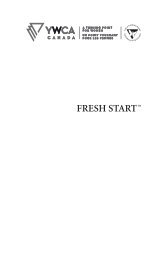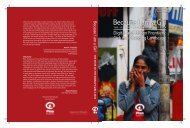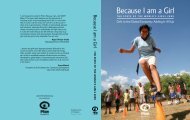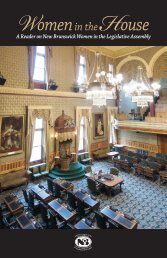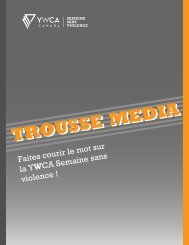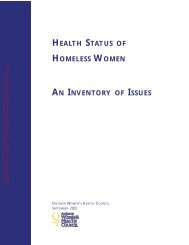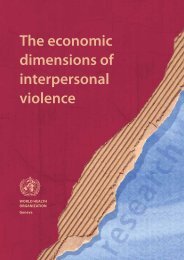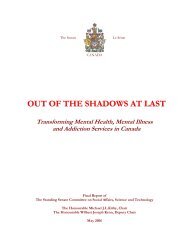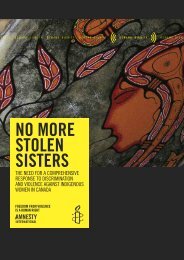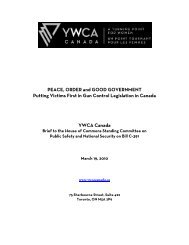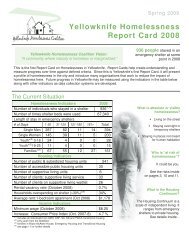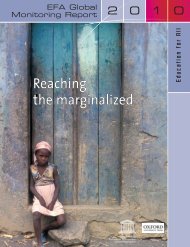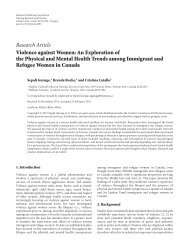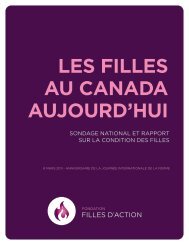Gender Report Card on the International Criminal ... - YWCA Canada
Gender Report Card on the International Criminal ... - YWCA Canada
Gender Report Card on the International Criminal ... - YWCA Canada
Create successful ePaper yourself
Turn your PDF publications into a flip-book with our unique Google optimized e-Paper software.
Judiciary – Key Decisi<strong>on</strong>s Admissibility<br />
The Government’s appeals<br />
On 6 June 2011, <strong>the</strong> Kenyan Government filed an<br />
appeal against <strong>the</strong> admissibility decisi<strong>on</strong> of <strong>the</strong> Pre-<br />
Trial Chamber. 1629 It filed its document in support of<br />
<strong>the</strong> appeal <strong>on</strong> 20 June 2011. 1630 Article 82(1)(a) and<br />
Rule 154(1) provide for an automatic right to appeal<br />
decisi<strong>on</strong>s with respect to admissibility. At <strong>the</strong> same<br />
time, <strong>the</strong> Government requested <strong>the</strong> Pre-Trial Chamber<br />
leave to appeal what it saw as a procedural error in <strong>the</strong><br />
Pre-Trial Chamber’s decisi<strong>on</strong> <strong>on</strong> admissibility, arguing<br />
that <strong>the</strong> Chamber had erred in finding that it did not<br />
have to rule <strong>on</strong> <strong>the</strong> State’s request for assistance before<br />
ruling <strong>on</strong> <strong>the</strong> admissibility challenge.<br />
Asserting that <strong>the</strong> cooperati<strong>on</strong> decisi<strong>on</strong> of 29 June also<br />
pertained to admissibility and as such was subject<br />
to an automatic right to appeal, <strong>on</strong> 4 July 2011 <strong>the</strong><br />
Government of Kenya also appealed <strong>the</strong> decisi<strong>on</strong> <strong>on</strong><br />
cooperati<strong>on</strong>. 1631 The Government submitted that<br />
<strong>the</strong> Pre-Trial Chamber erred in fact by finding that<br />
<strong>the</strong>re was no documentary proof of <strong>the</strong> existence of<br />
investigati<strong>on</strong>s and that it erred in law in its finding<br />
that it could not order <strong>the</strong> Prosecutor to transmit<br />
evidence. In <strong>the</strong> event that <strong>the</strong> Appeals Chamber not<br />
accept <strong>the</strong> automatic appeal, <strong>the</strong> Government also<br />
filed a request for leave to appeal with <strong>the</strong> Pre-Trial<br />
Chamber. 1632<br />
In <strong>the</strong> 6 June appeal of <strong>the</strong> 30 May decisi<strong>on</strong> <strong>on</strong> <strong>the</strong><br />
admissibility challenge <strong>the</strong> Government of Kenya<br />
argued that <strong>the</strong> Pre-Trial Chamber erred in procedure,<br />
in its factual findings and in law. It c<strong>on</strong>tested <strong>the</strong><br />
Pre-Trial Chamber’s finding that Kenya was unwilling<br />
to c<strong>on</strong>duct investigati<strong>on</strong>s and asserted that it was<br />
actually unable to carry out <strong>the</strong>se investigati<strong>on</strong>s, for<br />
lack of evidence. The Government submitted that <strong>the</strong><br />
Pre-Trial Chamber erred procedurally by refusing <strong>the</strong><br />
Government request for a status c<strong>on</strong>ference and/<br />
or oral hearing. The Government argued that <strong>the</strong><br />
Chamber’s failure to rule <strong>on</strong> its request for assistance<br />
before issuing its decisi<strong>on</strong> <strong>on</strong> <strong>the</strong> admissibility left it<br />
without evidence ‘that might be of great importance<br />
to its investigati<strong>on</strong>s. The Government of Kenya is thus<br />
less able – through no fault of its own – to support its<br />
admissibility arguments.’ 1633<br />
The Government also submitted that <strong>the</strong> Chamber<br />
erred in fact, postulating that ‘<strong>the</strong>re is a “universe”<br />
of evidence about <strong>the</strong> Post-Electi<strong>on</strong> Violence in Kenya<br />
but that <strong>on</strong>ly part of that “universe” may be available<br />
to Kenya and <strong>on</strong>ly part – almost certainly a different<br />
1629 ICC-01/09-01/11-109 and ICC-01/09-02/11-104.<br />
1630 ICC-01/09-01/11-135 and ICC-01/09-02/11-130.<br />
1631 ICC-01/09-70.<br />
1632 ICC-01/09-71.<br />
1633 ICC-01/09-01/11-109 and ICC-01/09-02/11-104, para 27.<br />
part – available to <strong>the</strong> Prosecutor of <strong>the</strong> ICC’ (emphasis<br />
in original). 1634 The Government argued that any<br />
determinati<strong>on</strong> <strong>on</strong> <strong>the</strong> evidence presented must be<br />
d<strong>on</strong>e with <strong>the</strong> recogniti<strong>on</strong> of <strong>the</strong>se two ‘universes’. In<br />
additi<strong>on</strong>, <strong>the</strong> Government postulated that ‘as a matter<br />
of law, <strong>the</strong> Government of Kenya cannot be expected<br />
to investigate those against whom it may have no<br />
evidence, especially when <strong>the</strong> Prosecutor, who has<br />
evidence it appears, has declined to make his evidence<br />
available to <strong>the</strong> Government of Kenya’ (emphasis in<br />
original). 1635<br />
Overall, <strong>the</strong> Kenyan Government asserted that <strong>the</strong><br />
Pre-Trial Chamber erred in finding that <strong>the</strong>re were at<br />
present no investigati<strong>on</strong>s against <strong>the</strong> six individuals.<br />
The Government stressed that <strong>the</strong> Chamber too<br />
hastily rejected <strong>the</strong> admissibility challenge without<br />
taking into account <strong>the</strong> additi<strong>on</strong>al informati<strong>on</strong> <strong>the</strong><br />
Government intended to submit during an oral<br />
hearing. The Government also argued that <strong>the</strong><br />
Chamber failed to address <strong>the</strong> legal arguments<br />
put forward by <strong>the</strong> Government in its admissibility<br />
challenge regarding <strong>the</strong> correctness of <strong>the</strong> ‘same<br />
pers<strong>on</strong>, same c<strong>on</strong>duct’ test as applied by <strong>the</strong> Pre-Trial<br />
Chamber.<br />
On 4 July 2011, as indicated in its admissibility<br />
challenge, <strong>the</strong> Government of Kenya submitted<br />
its first updated investigati<strong>on</strong> report, as fur<strong>the</strong>r<br />
evidence in support of its appeal that investigati<strong>on</strong>s<br />
were <strong>on</strong>going. 1636 The report explained that an<br />
investigati<strong>on</strong> team, composed of ten senior police<br />
officers, was appointed shortly after <strong>the</strong> naming of <strong>the</strong><br />
six individuals by <strong>the</strong> Prosecutor and was currently<br />
c<strong>on</strong>ducting investigati<strong>on</strong>s <strong>on</strong> <strong>the</strong> ground. The team<br />
had interviewed at least 35 witnesses, but was still<br />
experiencing difficulties in locating witnesses it<br />
wished to interview. According to <strong>the</strong> Government,<br />
<strong>the</strong> <strong>on</strong>going investigati<strong>on</strong>s by this team have not<br />
as yet produced any evidence linking <strong>the</strong> six ICC<br />
suspects to <strong>the</strong> crimes alleged. With this submissi<strong>on</strong>,<br />
Kenya attempted to substantiate its asserti<strong>on</strong> that it<br />
was unable to carry out proceedings against <strong>the</strong> six<br />
pers<strong>on</strong>s because of <strong>the</strong> unavailability of evidence, not<br />
because of unwillingness <strong>on</strong> <strong>the</strong> part of <strong>the</strong> State to<br />
carry out such investigati<strong>on</strong>s.<br />
On 30 August 2011 <strong>the</strong> Appeals Chamber, by majority<br />
decisi<strong>on</strong>, c<strong>on</strong>firmed <strong>the</strong> Pre-Trial Chamber’s decisi<strong>on</strong><br />
rejecting <strong>the</strong> admissibility challenge. 1637 Judge Ušacka<br />
issued a dissenting opini<strong>on</strong>, dissenting from <strong>the</strong> entire<br />
decisi<strong>on</strong>. The dissenting opini<strong>on</strong> and <strong>the</strong> majority<br />
decisi<strong>on</strong> are discussed in detail below.<br />
1634 ICC-01/09-01/11-109 and ICC-01/09-02/11-104, para 29.<br />
1635 ICC-01/09-01/11-109 and ICC-01/09-02/11-104, para 36.<br />
1636 ICC-01/09-01/11-159-Anx1 and ICC-01/09-02/11-153-<br />
Anx1.<br />
1637 ICC-01/09-01/11-307 and ICC-01/09-02/11-274.<br />
268



